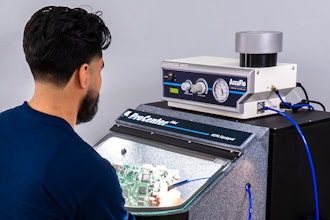
The Biden Administration announced last week $1.4 billion in funds to develop new COVID-19 vaccines as part of its Project NextGen initiative.
According to Reuters, Regeneron Pharmaceuticals will receive $326 million to develop a new monoclonal vaccine against the virus. An additional $1 billion will go to the Biomedical Advanced Research and Development Authority (BARDA) to fund mid-stage clinical trials.
Other companies are benefiting from the funding, including $100 million going to the non-profit Global Health Investment Corp (GHIC). This organization manages the BARDA Ventures investment portfolio, and the award will expand investments in new technologies to accelerate vaccine development.
Medical giant Johnson & Johnson Innovation (JLABS) received $10 million for a competition through Blue Knight, a BARDA-JLABS partnership.
COVID-19 is still big business, as well. CNBC reports Novavax's stock price jumped 13% after the company said its new vaccine provided a broad-spectrum response to the virus, including the EG.5 variant, referred to as Eris.
Although the vaccine was first targeted to combat the XBB.1.5 Omicron descendant, that variant is declining worldwide. Eris and another variant, XBB.1.16.6, are becoming dominant in the United States.
Research Continues
The COVID-19 virus is ever-changing, creating the need for updated vaccines.
Researchers are studying seasonal patterns and viral mutations and adapting vaccines to combat the virus's changing face. Helen Branswell of the medical news site Stat, says scientists hope the virus will settle into a more seasonal pattern, like influenza, but that hasn't happened yet and may not for several years to come.
Michael Osterholm, director of the University of Minnesota's Center for Infectious Disease Research and Policy, explains, "There just isn't a definable pattern yet that would call this a seasonal virus. That's not to suggest it might not be some day."
The CDC is monitoring new COVID-19 strains all the time. One variant the organization is eyeing is the BA.2.86 variant.
Jesse Bloom, an evolutionary biologist at Fred Hutch Cancer Center, told NBC's Aria Bendix, "We have not seen a new variant [in humans] with this many new spike mutations happening all at once since the emergence of the original Omicron."
Scientists won't know how transferable this variant is or if it's capable of causing widespread infection for a few weeks.
Current vaccines don't target newer strains, and researchers are scrambling to formulate vaccines that will be effective against new COVID mutations if it turns out these variants can spread worldwide. Updated booster shots are coming in the next few months, but these may or may not be effective against newer strains.
Preventing Long COVID-19
One of the worst after-effects of the COVID-19 virus, especially before vaccines were available, is what medical professionals call "long COVID." This is a cluster of symptoms affecting those who have recovered from the disease itself but are left with a range of issues they didn't have before contracting the virus.
Amy Goldstein, reporting for The Washington Post, says even those who had a mild case of COVID-19 may be left with symptoms including fatigue, brain fog, cardiac issues, diabetes, kidney and lung issues, blood clotting problems, and many others. These symptoms can range from mild to debilitating.
Allyson Mainor, of Milledgeville, Ga., and her husband, David, contracted the virus in April 2020. While both recovered, both are still feeling the effects of long Covid. Mrs. Mainor had a moderate case but had to have the stents in her heart replaced in November 2021.
Her cardiologist said her symptoms are consistent with patients who have had Covid. Mrs. Mainor said she's still unable to work full-time because of the fatigue. Although she applied for disability, her application was denied. She is currently waiting on the results of her appeal of that decision.
Mr. Mainor had a severe case requiring hospitalization. He was airlifted from Milledgeville to University Hospital in Augusta, Ga. He was placed on a ventilator for 12 days, with a subsequent six-week stay in rehab. He has lingering kidney damage and balance issues, which resulted in him falling and breaking each hip. Mainor said the disease left him with medical problems he never had before and has "ruined his health."
"Covid turned our lives upside down," Mrs. Mainor says. "Due to us both contracting Covid, even though we've recovered, it's impacted his health and mine. My blood pressure is harder to control, I'm experiencing more fatigue and brain fog, have phantom smells, hair loss, and had to stop working altogether for over a year to take care of my husband, since he's a fall risk. He's having ongoing physical therapy to improve his balance and mobility."
They are not alone. While exact numbers of those with long Covid symptoms are hard to pin down, estimates indicate as many as 15 million Americans may be experiencing some form of the syndrome.
The Journal of Health Economics and Outcomes Research (JHEOR) reported in 2022 that Dr. David Cutler of Harvard University estimated the total cost of long Covid to be $3.6 trillion. Further estimates indicate that, as of 2022, the virus has left as many as 4 million Americans unable to work.
Dr. Cutler himself concluded the costs of addressing long COVID are a worthwhile investment, given the widespread, ongoing economic costs of this condition.
President Biden plans to urge Americans to get the new COVID-19 boosters when available, based on CDC reports of an increase in infections, although hospitalizations are still low. Prevention is still the most cost-effective option.






















